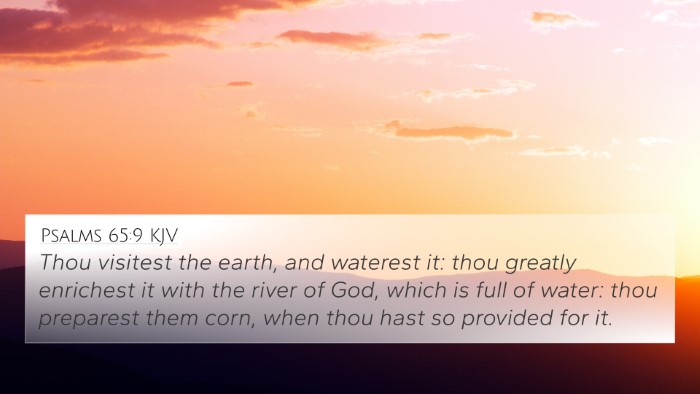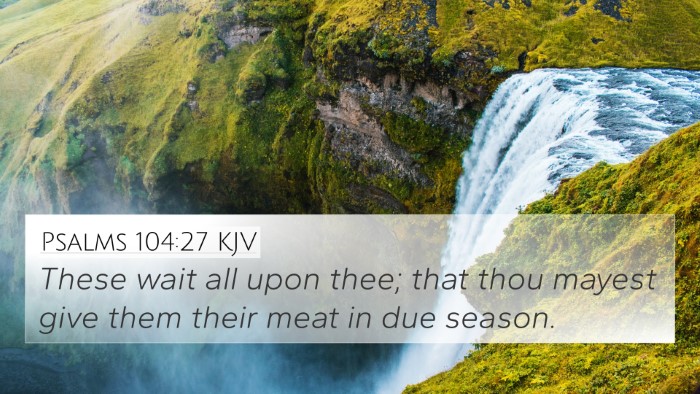Psalms 145:9 - Meaning and Interpretation
Psalms 145:9 states, "The LORD is good to all, and his mercy is over all that he has made." This verse beautifully encapsulates the character of God as a benevolent creator, whose goodness and mercy extend to all His creations. Below, we delve deeper into the meaning of this verse with insights from renowned public domain commentaries, which illustrate the richness of its meaning and its place within the broader Biblical context.
Insights from Public Domain Commentaries
Matthew Henry's Commentary
According to Matthew Henry, this verse emphasizes the universality of God's goodness. He notes that God's grace is not limited to a select few; instead, it encompasses every creature. God's mercy is an essential attribute that fosters a relationship with His creations, granting them what they do not deserve. This serves as a profound reminder of God’s benevolence and suggests that His goodness is inherent and unchanging.
Albert Barnes' Commentary
Albert Barnes elaborates that the phrase "the LORD is good to all" signifies God's equity in treating each being with kindness. He writes that the mercy of the Lord signifies His compassion and loving-kindness, particularly toward the humble and those in need. Barnes points out that this verse serves as an invitation to recognize and acknowledge God's perpetual kindness, encouraging believers to show similar mercy toward others.
Adam Clarke's Commentary
Adam Clarke provides additional historical context by linking this verse to the themes of creation and divine sustenance. He asserts that God's goodness not only initiates life but also sustains it, providing for every need. Clarke emphasizes that God's providential care is evident in every aspect of existence, thus underscoring the importance of gratitude in the believer's life.
Thematic Bible Verse Connections
- Matthew 5:45: This verse points to God's kindness, illustrating that He sends rain on the just and the unjust alike, highlighting the impartial nature of His goodness.
- Lamentations 3:22-23: Reflecting on God's steadfast love and mercy, this passage resonates with Psalm 145:9 by affirming that His mercies are new every morning.
- Psalm 136:1: This verse proclaims, "Give thanks to the LORD, for he is good. His love endures forever," echoing the message of God's eternal goodness.
- Romans 2:4: This verse reminds us that God's kindness leads to repentance, indicating that His goodness is not merely passive but actively draws people towards Him.
- James 1:17: Here, all good gifts are outlined as coming from the Father of lights, paralleling the theme of God's goodness encompassing all creation.
- John 3:16: The expression of God's love through Jesus’ sacrifice further emphasizes His overarching mercy toward humanity.
- Exodus 34:6: This passage explicitly states God’s merciful nature, affirming that He is merciful, gracious, and abounding in steadfast love.
Cross-Referencing Biblical Texts
Cross-referencing this verse reveals interconnected themes emphasizing God’s character:
- God's Sovereignty and Care: Psalms 104:27-28 illustrates how all creatures depend on God for their sustenance.
- Call to Worship: Psalms 100:5 encourages praise for the Lord's enduring goodness.
- Divine Compassion: Matthew 9:36 depicts Jesus’ compassion for the crowds, reflecting God's merciful heart for His creation.
Connecting Old and New Testament Themes
The wisdom embedded in Psalm 145:9 also finds resonance in the New Testament, offering a cohesive understanding of God's character across Scripture. This cross-referencing allows for a deeper thematic exploration and highlights the continuity of divine principles:
- Love and Goodness: 1 John 4:16 emphasizes that God is love, which harmonizes with the themes presented in the Psalm.
- Grace Extended to All: Acts 10:34-35 showcases Peter recognizing that God shows no favoritism, aligning with the universality found in Psalm 145:9.
Practical Applications and Reflections
Understanding Psalm 145:9 encourages believers to reflect on the nature of God and how that should influence their interactions with others. As a call to emulate God's mercy and goodness, this verse fosters an attitude of thankfulness and compassion:
- Practice Gratitude: Regularly acknowledge God's goodness in your life through prayer and thanksgiving.
- Extend Mercy to Others: Reflect on how God has shown you grace, and apply that in your relationships.
- Engage in Acts of Kindness: Find practical ways to express God's goodness, such as volunteer work or supporting those in need.
Conclusion
Psalms 145:9 serves as a beautiful reminder of the unfailing goodness and mercy of God. By cross-referencing this verse with others, we gain a holistic understanding of God's character and are equipped with guidance on how to live out these attributes in our daily lives. The interconnectedness of Scriptures encourages us to continually explore these themes, deepening our understanding and appreciation of God's mighty work both in our lives and in the world around us. This dynamic exploration invites every believer to embrace God's goodness and extend it to others, embodying the grace that permeates the entirety of Scripture.












